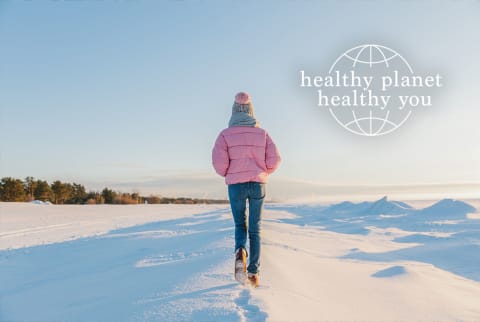Advertisement
Healthy Planet, Healthy You: Climate News To Know


Uh, is living in a city making your skin more sensitive?
Researchers investigated how living in an urban area can affect skin health. As it turns out, many aspects of the built environment—from higher population density to increased air pollution—may lead to increased skin sensitivity.
Previous studies have also shown that inhabiting more biodiverse, less sterile environments can pay dividends for our full-body microbiome. This is yet another reason to spend more time in nature, even if it's just a pocket park or patch of trees. Your skin barrier may thank you for it! (Read the full study here1.)
It's time to treat your home like the biodiversity hotspot it is
How many critters do you share your backyard with? That's the question that two neighbors, a mathematician and an ecologist, set out to answer in their shared suburban yard in Brisbane, Australia. After 12 months of surveying, the duo discovered an impressive 1,150 species—436 moths and butterflies, 56 spiders, 56 birds, and three previously undiscovered species.
This is far more than the 200 species they expected to find on their reconnaissance, proving that we don't necessarily need to travel far to connect with a vibrant world of wildlife. And doing so could pay serious dividends for your mental health and sense of environmental stewardship. (Read a study recap here.)
Climate change is making good sleep a distant dream
We tend to sleep best in cool environments, so researchers suspect that climate change will take a major toll on our snooze. A new study that analyzed sleep data from 7,240 older adults in China over two years found that heat wave events were indeed associated with a higher likelihood of a one-plus-hour reduction in sleep.
Women, urban residents, and individuals with chronic diseases had a higher risk of sleep disruption. This research underlies the need to treat the climate crisis for what it is: a health crisis—and one that's especially dangerous for the world's most vulnerable. (Read the full study here2.)
Humans are threatening wildlife health—but a few changes could make a big difference
After analyzing years of digital records from nearly 100 wildlife rehab centers in the U.S. and Canada, researchers found that the majority of wildlife injuries and illnesses are the result of human activity (i.e., vehicle collisions, pesticide and lead poisoning, etc.).
Their study calls for changes, like more wildlife underpasses and overpasses across roads and stricter chemical regulations, that could go on to improve wildlife health and human health in the long run. (Read the full study here3.)
Set a climate resolution that's personal to you
Every year around this time at mindbodygreen, we ask a therapist or mental health expert the same eternal question: What's the secret to setting resolutions that stick? Most agree that the best goals are deeply personal and values-driven.
"Sometimes, we make goals or resolutions based on pressure from others rather than from a personal, internal drive toward the goal. Psychologists consider the former to be 'extrinsic motivation' and the latter to be 'intrinsic motivation.' Intrinsic motivation, which comes from within, is the strongest," clinical psychologist Chloe Carmichael, Ph.D., explains.
Psychologist Erin Ayala, Ph.D., L.P., CMPC, elaborates that "We need to identify our values in order to set the stage for the coming year. Values are the foundation of many of our behaviors, actions, thoughts, and feelings. They serve as our guide on how to respond when life gets messy."
From a climate perspective, this advice shows us why more general goals to "reduce my carbon footprint" or "buy less stuff" might not always pan out. They lack the personal meaning and passion needed to keep us on track.
To get more specific, consider reflecting on your favorite outdoor moments this past year: Where did you spend them, who were you with, and what were you doing? Examine how these moments made you feel and why they were so significant to you personally.
Then, use this reflection to inform your climate resolutions. If you loved spending time in a nearby park, maybe you could get involved in cleaning it up. Or if all your reflections involved friends, consider if there are any sustainability-focused community groups you could join in your neighborhood.